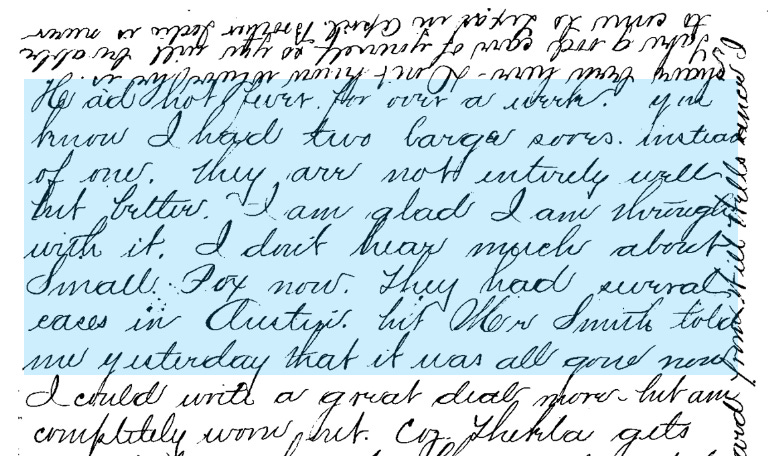It’s been a little over a year since I wrote about the impact of Measles morbillivirus on our ancestors, here. And it’s been a little over a year since the ongoing pandemic started having a major impact on our current lives.
A few things have changed since then. Masks are easier to find, businesses and workplaces have started reopening, virtual meetings are booming, and… drumroll please… we have COVID vaccines. More than one kind, even!
So what? This is a family history newsletter — so, why are we talking about vaccinations???
Saying No to Smallpox
Irene Norris, one of my great-great-grandmothers, was born in April of 1871 (150 years ago!) in Louisiana. But by early 1891, when she was not quite 20 years old, Irene was living with her brother-in-law and nieces and a toddler nephew named Archie in Round Rock, Texas. Her eldest sister, Lizzie, had just died in January of that year.
In a letter to her mother dated January 26, 1891, Irene writes:
I had such a terrible time with my vaccination. Had hot fever for over a week. You know I had two large sores instead of one. They are not entirely well but better. I am glad I am through with it. I don’t hear much about Small Pox now. They had several cases in Austin, but Mr. Smith told me yesterday that it was all gone now. I could write a great deal more, but am completely worn out. [….] Archie vaccinated himself on the ankle — notwithstanding he was vaccinated on his arm too.
Read the entire thing here, if you feel like it: PDF and images on OneDrive
Inoculation against smallpox, Variola virus, was practiced at least as far back as the 16th century in China. And the first “modern” vaccine was developed in the late 18th century to combat — you guessed it — smallpox. By the time Irene and little Archie got their shots, the smallpox vaccine had been around for almost 100 years.
The outbreak in Austin, Texas in 1891 was fairly minor, historically speaking, and was kept in check in large part by both quarantining the sick and promoting mass vaccination. In May of 1891, the Austin American-Statesman newspaper declared:
Our fair and beautiful city is free of the disease. [….] As a warning for the future the fact is stated that every one of the deaths was among those persons who had never been vaccinated.
Of course, this being Texas, not everyone was on board with these kinds of government-controlled public health policies. At one point the governor even sent the Texas Rangers to Laredo to enforce fumigation efforts in the poorer Mexican-American barrios, which… was a whole thing. Plus, some people were convinced that the vaccine was more dangerous than the disease itself, or that the disease could be more effectively prevented by things like homeopathic sugar pills or scented oils.
The More Things Change, the More They Remain the Same
Sound familiar?
People have been debating the efficacy of vaccines and the ethics of state-provided or -mandated disease prevention measures since we invented them. That’s nothing new.
What is new is us. Our current medical tech and research environment and economic resources give us a better shot at combating epidemics now than our ancestors ever had. And I think that one of the best things we can do to honor the memory of our ancestors is to learn from what they went through — and try to deal with it just as well, or even better.
If you can get a COVID vaccine now, please consider doing so. I know some folks are a little nervous about getting a shot while it’s still in the “emergency use authorization” phase of FDA approval, and that’s valid.
But! If you’re hesitating just because you think other people “deserve” to get a dose first or you don’t want to “steal” someone’s spot in line? If you’re hesitating just because you’re afraid you’ll feel a bit ill after getting jabbed? If you’re hesitating just because you might have to travel to an unfamiliar clinic in a different part of town? Stop hesitating! Just do it.
If little Archie could handle it himself, you can too.




Absolutely. It breaks my heart to see these outbreaks of measles, chicken pox, and other avoidable diseases today. I caught measles as a 12-year old because of a failure in my early-batch vaccine in the 1960s. The high fever and intolerable itchiness for 10 days or more will stay with me. My husband caught chicken pox as an adult (a decade or so before the vaccine was available) what a horrible — and terrifying disease. Extreme fevers and pustules? Yikes.